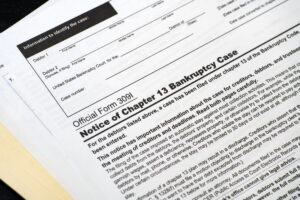
Our phone rings more on Fridays, usually toward the end of the day. That’s when people are opening up their paycheck or checking their bank balance on their phones and noticing that there has been a big drop. After they call their payroll department to find out what happened and spend some time on Google trying to figure out their options, they call us.
What Is A Garnishment?
A garnishment is a court order directing that money or property of a third party (usually wages paid by an employer) be seized to satisfy a debt owed by a debtor to a creditor.
When Can A Creditor Garnish My Paycheck In Colorado?
Most creditors cannot garnish your paycheck until after they have gotten a judgment. In order to obtain a judgment, they have to file a lawsuit and properly serve you. In Colorado, service requires them to hand the lawsuit to you personally. They can also serve other adults you live with and certain people at your employer.
If you ignore the lawsuit (which is a really bad idea), the court will automatically award them judgment. If you ignored the lawsuit and didn’t respond to it, the creditor doesn’t need to tell you in advance that they are going to garnish you. You may not find out until you look at your paycheck and notice it’s short if your employer doesn’t tell you in advance.
There are some creditors who can garnish you without a lawsuit. You can be garnished for court-ordered child support without a lawsuit. You can also be garnished for federal student loans or federal and state tax debt without a lawsuit.
Can A Creditor Do Anything Besides Garnish My Paycheck?
A judgment order allows a creditor to collect what you owe from all available sources. In addition to your paycheck, the creditor can levy (garnish) your bank account. This can be a huge inconvenience since all the funds in your account are going to be frozen until you ask the court to limit the levy to the allowable amount the creditor can take. For example, if the money in the account was from workers’ compensation, creditors can’t take it. It could take several weeks to get in front of a judge, however. In the meantime, you may miss your rent payment or not be able to fill your car up with gas or your refrigerator with food.
How Do I Stop A Garnishment In Colorado?
If a lawsuit has progressed to the point where a creditor has gotten judgment, there are probably few things you can do. First, find out who is garnishing you. Ask your payroll department for a copy of the writ of garnishment. That is the court order directing your employer to turnover part of your pay to the creditor.
The writ of garnishment will tell you who is garnishing you, how much you owe, and the law firm representing the creditor. Call the law firm. At this point, the creditor will likely not talk to you. Even if they will, they’ll have to contact the law firm to stop the garnishment. Cut out the middleman and call the lawyer first.
Before you make that call, I want you to understand something. You are going to have to pay this debt. The creditor has hired a lawyer who has gotten a judgment. That judgment tells the world that you legally owe the debt and allows them get that money from you until the debt is paid in full. Until you pay the debt in full, the creditor is going to be able to add interest and legal fees on top of what you owe them.
What if I never got served?
Sometimes people will tell me that they never got served with the lawsuit. I’m not going to tell you that that couldn’t happen. I just think it’s rare. Unless the debt isn’t yours, fighting the creditor because they didn’t properly serve the lawsuit is probably only going to delay your garnishment. If the court dismisses the lawsuit because it wasn’t served properly, once you come back to court to make that argument the creditor will be able to serve you properly.
When you call the law firm, let them know why you are calling and ask them if there is anything you can do to stop the garnishment. In all likelihood, you’ll only have two options: pay the debt in full or set up a payment plan that is more manageable than having money taken out of your paycheck every payday.
If they’ll take a payment in full, they’ll want it right away and will keep garnishing you until you get them that amount. Unless you have a large chunk of money laying around, making a lump sum payment isn’t going to be possible.
As far as taking payments instead of garnishing you, in my experience, once a creditor starts garnishing someone, they’re not going to stop until they’ve been paid in full. With a garnishment, they know they’ll keep getting paid. If they accept payments, they don’t know if you’ll stop making them.
How To Avoid A Garnishment In Colorado
The best way to avoid a garnishment is to not ignore any lawsuits. You can do a couple of things: you can either respond to the lawsuit by filing an answer or negotiate a settlement or payment terms.
The challenge with responding to the lawsuit is that you’re going to have to prove, in court, that the debt was never yours. If you can’t prove that, then the court will enter a judgment order.
Creditors are more agreeable to a payment plan at this point, before the garnishment starts. Of course, they’ll want a payment that will lead to the debt being paid in full in a reasonable time, so don’t expect them to agree to monthly payments of $50.00 for a $10,000.00 debt.
Bankruptcy Can Stop A Garnishment In Colorado
What can you do if you can’t convince the creditor to stop the garnishment? That’s where we come in.
Bankruptcy is the most powerful weapon in your battle to get your financial life on the right track. Bankruptcy will kill the garnishment dead. The second your petition is uploaded to the bankruptcy court’s website, all collection actions have to stop. No one can garnish your paycheck, levy your bank account, or repossess your car.
Keep in mind that it can take some time for a petition to get filed. First, it has to be prepared and reviewed by you and your lawyer. Your lawyer will want to make sure that there aren’t any issues in the rush to get your case filed that could complicate your bankruptcy. Even after you hire your attorney, you’re probably going to get garnished once or twice before your bankruptcy case is filed. If the garnishment is going to be paid off in a few paydays, it probably doesn’t make sense to bother with bankruptcy unless you are expecting other garnishments to happen soon.
The first step on the road to financial recovery is to schedule your free consultation with an experienced Colorado bankruptcy attorney. We’ll review your financial situation, talk about your different options and next steps, and tell you exactly how much your bankruptcy will cost. Click here to schedule your appointment.
Check out our client reviews on Google, Facebook, and Avvo!


